US Curbs Exports To Iranian Firms Producing Drones For Russia

The United States Tuesday added seven Iranian entities to its trade blacklist for producing drones that Russia uses to attack Ukraine, the Department of Commerce said.

The United States Tuesday added seven Iranian entities to its trade blacklist for producing drones that Russia uses to attack Ukraine, the Department of Commerce said.
Nearing a year since Russia's invasion of Ukraine, allies have scrambled to gather and deploy air defenses to defeat cruise missiles and Iranian-built kamikaze drones that have attacked energy infrastructure this winter.
Tehran’s decision to supply drones to Moscow has led to Western backlash against the Islamic Republic amid suspended nuclear talks and the violent suppression of protests in Iran. Washington says Tehran should stop its military support for Russia and the crackdown on protesters.
After Ukraine brought down some Iranian drones and examined their remains, it was discovered in November that dozens of American and Canadian parts were used in their manufacturing.
Other ground-based air defense systems such as Raytheon Technology Corp's RTX.N Patriot have been pledged by the United Kingdom, the United States and the Netherlands as allies hope to stave off further power disruptions.
The Iranian entities added to the blacklist are Design and Manufacturing of Aircraft Engines, Islamic Revolutionary Guard Corps Aerospace Force, Islamic Revolutionary Guard Corps Research and Self-Sufficiency Jihad Organization, Oje Parvaz Mado Nafar Company, Paravar Pars Company, Qods Aviation Industry, and Shahed Aviation Industries.
The Commerce Department posting said the Iranian drones are being transferred to Russia for use in Ukraine, activity that is contrary to US national security and foreign policy interests.

Some Iranian observers suggest that the West is not likely to respond to Iran's renewed calls for nuclear talks unless Tehran stops helping Moscow in its war.
At the same time, some US and Iranian officials and commentators are adamant that the JCPOA is dead, while other whisper of an interim agreement.
Newsweek quoted US National Security Council Strategic Communications Coordinator John Kirby as saying last week that "There has been no progress on the Joint Comprehensive Plan of Action (JCPOA), and we are not looking to make progress on the JCPOA anytime in the near future. "Iranian sources also claimed that Kirby said, "The United States is preparing to consider alternative options."
Iran’s hard-line daily Khorasan wrote that there is no hope in the revival of the JCPOA, adding that politicians in the West are interested in some sort of agreement with Tehran about lifting some of the sanctions in exchange for restricting Tehran's nuclear activities. However, sources noted that any miscalculation on either part might change the situation.
In the meantime, if the West does nothing, Iran will get closer to 90-percent Uranium enrichment any moment, Nameh News quoted Western sources.
Long negotiations in Vienna came to a halt in March 2022 when Iranian negotiators returned to Tehran for consultation and almost everyone in the West was hoping to reach an agreement with Tehran soon, but Iran was not forthcoming.
Meanwhile, one month into the war in Ukraine, Russian foreign minister's demand for guarantees from the US that sanctions over Ukraine would not affect its relations with Tehran outraged many in Iran. Lavrov asked for guarantees from the US, at the minimum level of Secretary of State, that US sanctions over Ukraine would not affect Russia's "right to free, fully-fledged trade and economic and investment cooperation and military-technical cooperation with Iran” under the terms of the JCPOA.
Subsequently, several Iranian analysts and opposition politicians blamed Russia for the suspension of the talks in Vienna. One of those commentators was the former chief of the Iranian parliament's National Security and Foreign Relations Committee Heshmatollah Falahatpisheh who accused Russia of following its own interests and damaging Iran's possible benefits in an agreement.
In an interview with Khabar Online published on Sunday, January 29, Falahatpisheh said that he even fears a Russian scenario to start a war between Iran and another country to distract the West from what is happening in Ukraine and reduce pressures on Moscow.
He said no one in the government responded to his suggestions for leaving the Ukraine war in a bid to revive the JCPOA. He added that currently, those who always opposed the West in Tehran are sending messages to the West calling for the revival of the deal but no one in the West seems to be interested.
Falahatpisheh reiterated that Iran's interests may have been sacrificed for the interests of others [Russia].He added that there are looming geopolitical threats against Iran and even Europe has plans against Tehran. He was possibly referring to the idea of listing the IRGC as a terrorist organization.
The former lawmaker, who is traditional conservative critical of hardliners, said that Iran, Europe and the United States had reached a consensus on the text of an agreement before Russia disrupted the talks by demanding guarantees from Washington. Falahatpisheh added that a consensus against Iran would have not been formed in Europe if Tehran had not sent drones to Russia to be used in the war against Ukraine.
It is in this situation that the Financial Times says an interim agreement with Iran could save Tehran from troubles. The FT quoted Ellie Geranmayeh an analyst at the European Council on Foreign Relations as saying "“The Iranians are not pushing for a deal. They understand even if there’s an agreement that provides sanctions relief, it’s going to be minimal, so it’s become even harder for anyone to stick their neck out for a deal.” According to the FT, one option for Iran would be to seek an interim agreement that keeps Tehran's nuclear ambitions under control while at the same time offers limited sanction relief to Tehran.
Under pressures from protests and a chronic economic crisis that has reached its worst stages during the past year, an Iranian government which plans to sell out state assets to make ends meet, might be ready this time to take any agreement that is thrown at it, interim or otherwise.

Iran's Foreign Ministry has summoned Ukraine's charge d'affaires over remarks by a Kyiv official seen by Tehran as Kyiv’s role in a recent drone attack in Esfahan.
The ministry summoned the Ukrainian envoy to ask for explanation in reaction to comments by Mykhailo Podolyak, an adviser to President of Ukraine Volodymyr Zelenskyy, about the drone attacks against the Defense Ministry's facility in Esfahan (Isfahan) on Saturday night.
In a tweet in which Podolyak was mentioning some telegraphic developments of the Russian invasion, he said, “Explosive night in Iran - drone and missile production, oil refineries.” He continued, “Ukraine did warn you,” referring to repeated calls on Tehran to stop supplying arms to Moscow.
Podolyak said, "War logic is inexorable and murderous. It bills the authors and accomplices strictly," adding, “Panic in the Russian Federation -- endless mobilization, missile defense in Moscow, trenches 1,000 kilometers away, bomb shelters preparation.”
Nour News Agency, affiliated with the Iranian Supreme National Security Council (SNSC), said earlier that "If Ukraine’s government fails to officially renounce the tweet by Zelenskyy's advisor, which implied Kyiv's complicity in the move against Iran, it will have severe consequences for them."
Tehran is questioning Kyiv’s involvement in the attack despite reports that point the finger at Israel. The Wall Street Journal said in an exclusive report Sunday that Israel carried out the drone attack on the military center for research and development.
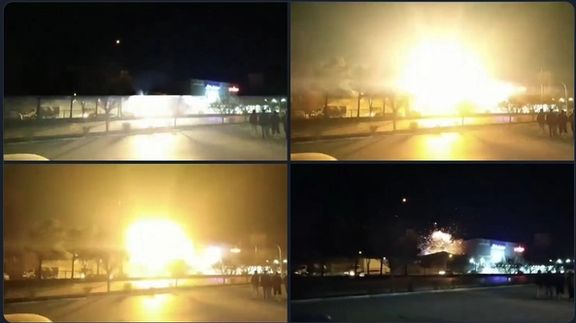
Russia on Monday also condemned the drone strike and warned against what it called "provocative" actions that could trigger an escalation in an already tense situation.
"Such destructive actions could have unpredictable consequences for peace and stability in the Middle East," Moscow's Foreign Ministry said.
Tehran has supplied hundreds of drones to Russia since mid-2022 that have been used during missile attacks to inflict more damage or to swamp Ukrainian air defenses. The United States and Europe have imposed new sanctions on Tehran for its expanded military ties with Moscow and also its deadly crackdown on protests since last September.
The attack targeted what some sources said was Material and Energy Laboratory of Esfahan with what the defense ministry called “small drones.” Videos citizens sent to Iran International showed an explosion, although the government claimed its air defenses had fended off the attack. Small or quadcopter drones, however, cannot fly hundreds of kilometers to reach Esfahan, located in central Iran. If indeed the attack was carried out with small drones, it would mean operators were present on the ground, in Iran.
According to the Israeli weblog Intellitimes, the target of the drone attack was the "Iranian Space Research Institute" affiliated with the ministry of defense. The Jerusalem Post, citing Western and foreign intelligence sources, also wrote that contrary to Iran’s claim the attack on "advanced weapons development" facility was a "tremendous success".
The attack on Saturday comes as the United States and Israel have expanded close military coordination, including drills just days earlier, as well as discussing ways to combat Iran’s capabilities.
Tehran’s supply of large, kamikaze Shahed-136 drones with a 45-kilogram warhead to Russia are a concern for the US and NATO. Russia has used hundreds of these drones to target Ukraine’s civilian infrastructure.
In addition to the attack, an aircraft targeted a convoy of trucks crossing from Iraq to Syria carrying suspected Iranian cargo on Sunday.
Government controlled media in Tehran claimed that the 25-truck convoy attacked on the Iraqi-Syrian border was carrying flour and food, while the route taken is a customary juncture for weapons deliveries to Iranian proxies in Syria and Lebanon. Suspected Israeli attacks have targeted trucks and warehouses near the Iranian controlled al-Qaim border crossing multiple times.
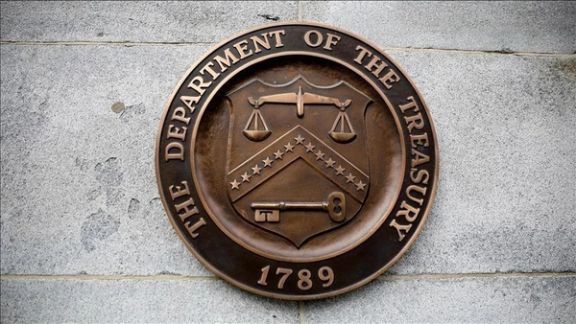
The United States is sending its top sanctions official to Turkey and the Middle East next week to warn countries and companies not to violate US sanctions on Russia and Iran.
Brian Nelson, undersecretary for terrorism and financial intelligence, will travel to Oman, the United Arab Emirates and Turkey from Jan. 29 to February 3 and meet with government officials as well as businesses and financial institutions to reiterate that Washington will continue to aggressively enforce its sanctions, a Treasury spokesperson told Reuters.
"Individuals and institutions operating in permissive jurisdictions risk potentially losing access to US markets on account of doing business with sanctioned entities or not conducting appropriate due diligence," the spokesperson said.
Although the trip appears to be firstly aimed at Turkey not to violate sanctions imposed on Russia, but Nelson will also raise the issue of Iran’s sanctions evasion.
Iran is using regional intermediaries to evade sanctions on its oil exports and financial transactions. The latest example is dollar smuggling from Iraq to Iran, which has prompted the US to scrutinize dollar transactions by Iraqi banks. The move has led to shortage of dollars in Iraq and fall of its currency.
Nelson will warn businesses and banks in Turkey that they should avoid transactions related to potential dual-use technology transfers, which could ultimately be used by Russia's military, the spokesperson said.
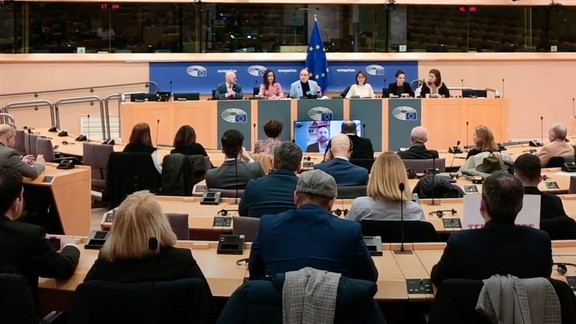
Members of the European Parliament held a meeting in the Belgian capital Brussels to discuss the designation of Iran’s Revolutionary Guard as a terrorist organization.
Swedish democrat Charlie Weimers, member of Belgian Parliament’s Committee on Foreign Affairs Darya Safai, and Dutch Minister of Justice and Security Dilan Yeşilgöz-Zegerius as well as many other activists such as RAND think tank analyst Alireza Nader and Stockholm-based rights defender Iraj Mesdaghi were among the participants.
The organizers and speakers of the meeting said they gathered together with the aim of providing more information to international and intergovernmental organizations and raise awareness about the reality of the IRGC. The session focused on two issues of the role of the Islamic Revolutionary Guard Corps in suppressing the antigovernment protests by the Iranian people and supplying arms for the Russian invasion of Ukraine.
According to the members of the parliament and political activists, the approval of the 32-point resolution adopted by the European Parliament on January 19, which called on the EU and member states to designate IRGC as a terrorist outfit, did not persuade the EU to take that step.
The European Parliament’s resolution also urged the EU to expand its sanctions list to cover all individuals and entities responsible for human rights violations and their family members, including Supreme Leader Ali Khamenei, President Ebrahim Raisi, Prosecutor General Mohammad Jafar Montazeri and all foundations (‘bonyads’) linked to the Islamic Revolutionary Guard Corps (IRCG).
During the Friday session, Weimers said, “The Islamic Revolutionary Guard Corps – or the IRGC -- stands up on behalf of the mullah's evil republic through tyranny murder and terrorism,” adding that “the IRGC is a force for political terror both at home and abroad.” It has trained, financed, armed and provided a safe haven for groups like Hezbollah, Hamas and Islamic Jihad, which have been listed as terrorists by many countries.
He also called on the EU to permanently suspend the talks to revive the 2015 nuclear deal, expressing regret that many members of parliament still hope that the agreement bears the fruits they seek.
The IRGC supported or motivated terrorist acts abroad, he said, noting that since the IRGC has provided support for assassinations, hijackings, bombings, kidnappings cyber-attacks, espionage, surveillance of Iranian dissidents, propaganda, delivery of explosives and arms all over Europe.
After the session, the Dutch justice minister twitted, “The Iranian Revolutionary Guards terrorize demonstrators fighting for freedom in Iran,” adding, “On behalf of the Netherlands, I again advocated adding the IRGC to the European terrorism list or imposing additional sanctions. We must continue to support the people of Iran.”
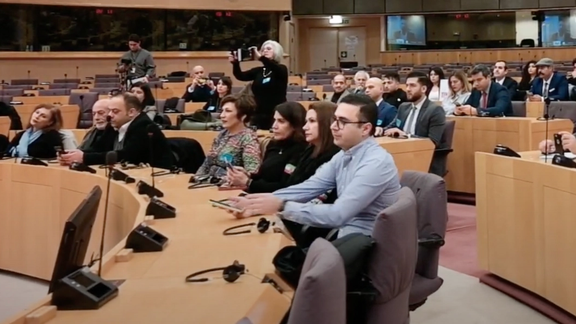
The issue of adding the Revolutionary Guard (IRGC) to the list of Europe’s terrorist entities became a rallying point for the Iranian diaspora, which launched online campaigns and held a large protest in Strasbourg on January 16 to lobby the European Parliament for passing the resolution.
The Iranian expatriates and members of the European Parliament also called for another gathering to push for the IRGC terrorist designation in Brussels on February 20.
The IRGC played a major role in suppressing antigovernment protests in the past four months, overseeing several security agencies that have killed over 500 civilians, jailed over 20,000 people and inflicted lasting injuries on hundreds of people.
Many officials of the European Union, including foreign policy chief Josep Borrell, are not in favor of sanctioning the IRGC, as they are concerned that the Islamic Republic will not be forthcoming in nuclear talks with the West. Negotiations that began in April 2021 to revive the 2015 Iran nuclear deal, known as the JCPOA, came to a deadlock last September. In the meantime, Tehran has supplied kamikaze drones to Russia, which are used in attacks on Ukraine’s civilian infrastructure.
The West has stepped up pressure on Iran over its crackdown on protests and arms supply for the Russian invasion of Ukraine as the US, the European Union and United Kingdom imposed fresh sanctions on Tehran. In a retaliatory move, the Islamic Republic also designated over 30 European and British individuals and entities.
Also on Friday, European Parliament President Roberta Metsola condemned the decision of the Iranian regime to sanction several MEPs, as well as journalists, human rights defenders and institutions, underlining that “Women have the right to protest. Women's lives and women’s liberties are inviolable. The European Parliament will not stop fighting for these fundamental values. We will not stop standing up for freedom, dignity and equality. We will not be silenced.”
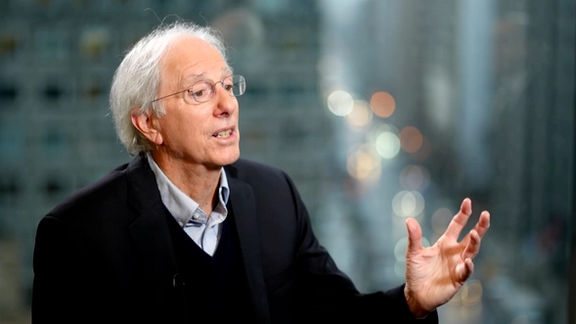
An American foreign policy aide in successive US administrations told Iran International that the only way the US would remove sanctions on Tehran is a whole new deal.
In a face-to-face with our correspondent Arash Alaei, Dennis Ross said that the Islamic Republic has lost its chance to revive the 2015 nuclear deal with making extra demands, noting that now the only move that may kickstart the talks is a halt in Tehran’s uranium enrichment to over five-percent purity.
Iran should not be enriching to 60 percent or even 20 percent, he said, adding that the Islamic Republic is crossing thresholds that may push the Biden administration to a path that it would not like to pursue, he said. The Biden administration might say “what was on the table is no longer on the table. You had a chance to do the JCPOA and you chose to try to get more,” he added.
He said that the administration sought a longer and stronger deal since the beginning, speculating that if they want to agree on a deal, it will not be going back to the JCPOA. “The deal has to apply for much longer; it has to be stronger, then there would be readiness to talk about a deal,” he said, foreseeing that Washington would ask Tehran to give up more if it wants to potentially get more.
Ross was the director of policy planning in the State Department under President George H. W. Bush, the special Middle East coordinator under President Bill Clinton, and a special adviser for the Persian Gulf and Southwest Asia -- which includes Iran -- to the former Secretary of State Hillary Clinton.
Referring to the recent round of Western sanctions on the Islamic Republic officials, Ross said that this is a message to Tehran that “we are collectively hardening our approach because of the behavior of the Iranian regime.” He added that slapping the Revolutionary Guard with the terrorism label by the Europeans has never been really considered. Ross mentioned the coordination among the US and its allies to close the loopholes so that Iran cannot sell its oil as another measure that showed the world is standing against the regime.
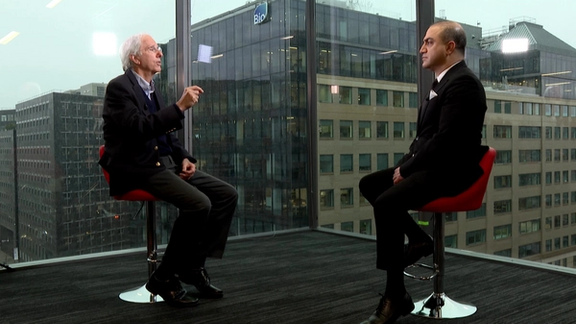
All of these indicate that “the Islamic Regime needs to understand that life is going to become more difficult for them if they stay in the path they are on,” he underlined.
The West on Monday stepped up pressure on Iran over its crackdown on protests and arms supply for the Russian invasion of Ukraine as the US, the European Union and United Kingdom imposed fresh sanctions on Tehran. However, the EU stopped short of designating the IRGC a terrorist outfit, as the European Parliament had voted last week to urge the block to do.
He said that the regime is enriching uranium to the levels that have no civilian use, elaborating that Iran “continues to move ahead with its nuclear program. It has 16 cascades of advanced centrifuges – the IR6s -- that are enriching to 60 percent, for which there is no justifiable civilian purpose.” “When you enrich uranium, you can rationalize it saying we’re going to use it to generate electrical power. When you enrich to 60 percent, you have one purpose in mind.”
The Islamic Republic “has probably four bombs worth of enriched material to 60 percent,” adding that “60 percent is not weapons grade but it’s close to weapons grade,” Ross said. It means it takes very little time for them to turn the fissile material into bombs, he added. “You still have to take that fissile material and take it to weapons. There is a big difference between enrichment, which is taking place in large facilities and the process of weaponization, which can be taking place in facilities that we wouldn’t be aware of,” Ross warned.
The Middle East expert believes that Iranians are playing with fire. If the Biden administration says, “we will prevent you from having a nuclear weapon, they are pushing the Biden administration towards what will be a military action, even if that's not what the Biden administration would prefer to do.”
About the joint military war games by the US and Israel -- their biggest so far with thousands of forces, a dozen ships, and 142 aircraft, including nuclear-capable bombers – he said the nature of this maneuver is unprecedented as they have integrated every domain. “They are doing it in space, they are doing it in air with aircraft, they are doing it in cyber, they are doing it on the ground, and they are doing it with naval. All these separate domains, all these separate forces are being integrated between the two and they include suppression of air defenses; it includes B52 bombers,” he added. The scope of such war games “involves a kind of action the US and Israel would be taking if there was a decision to carry out the use of force against Iran’s nuclear program.” He described the drills as a rehearsal or preparation for such an action against Iran, he highlighted.